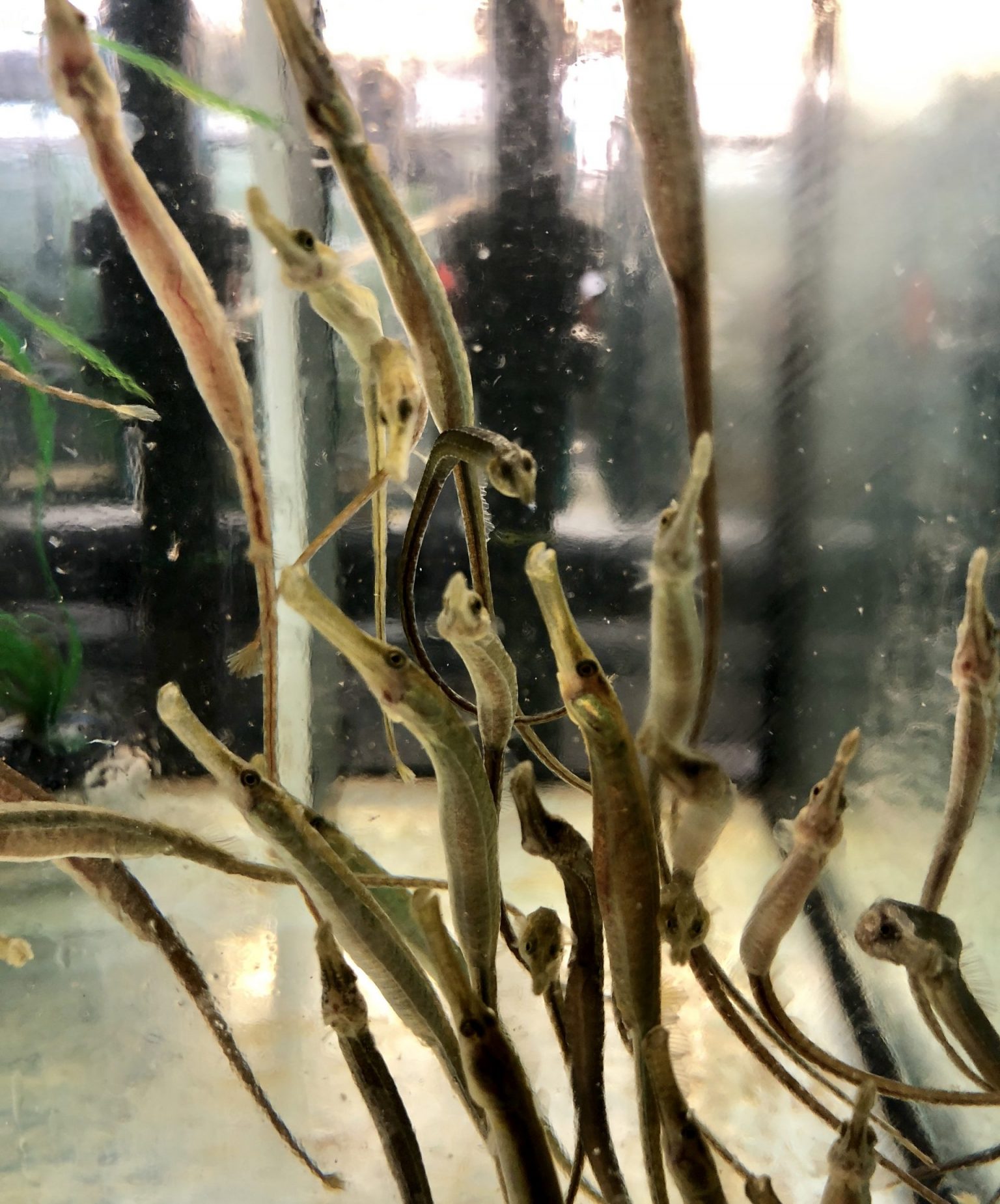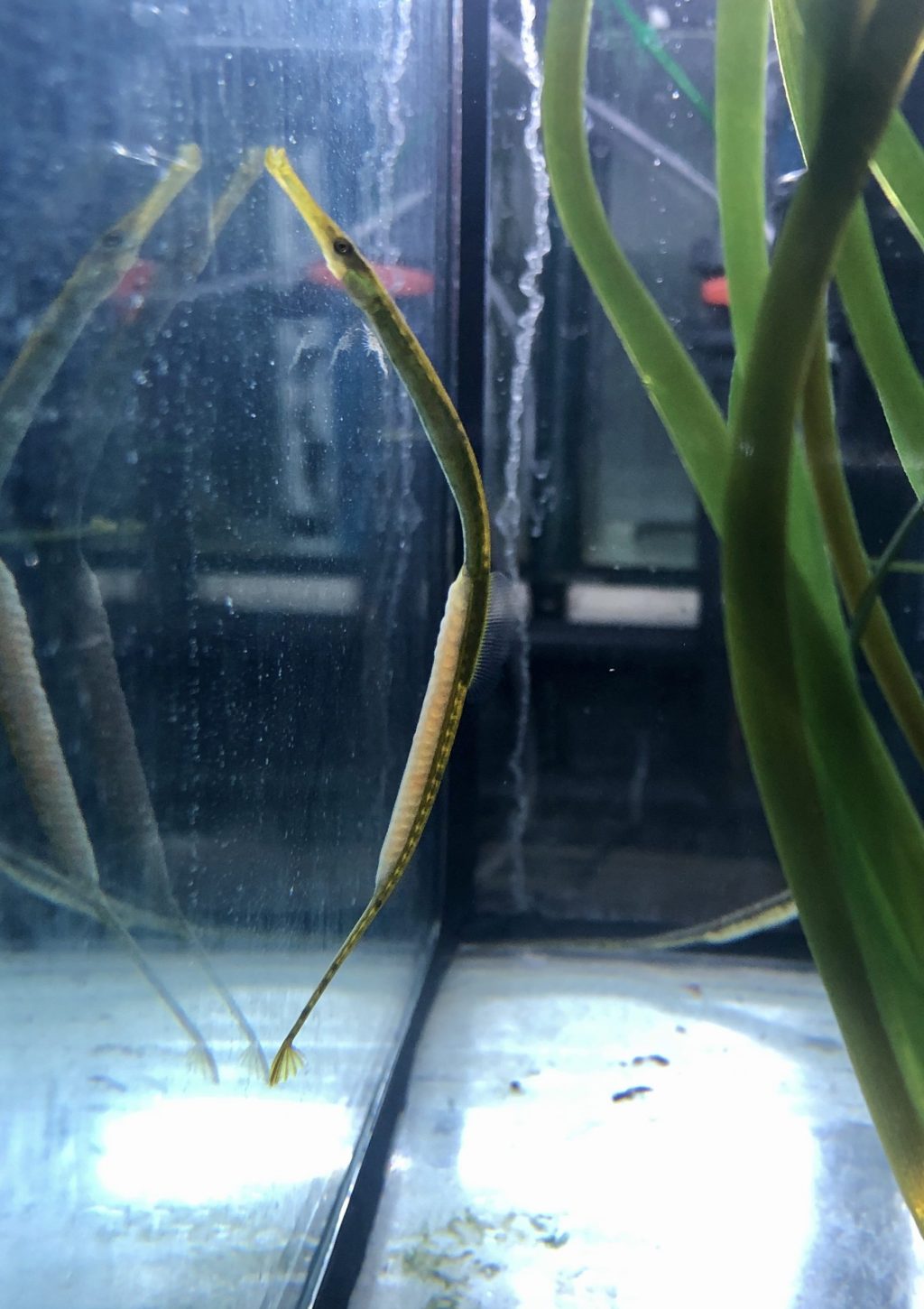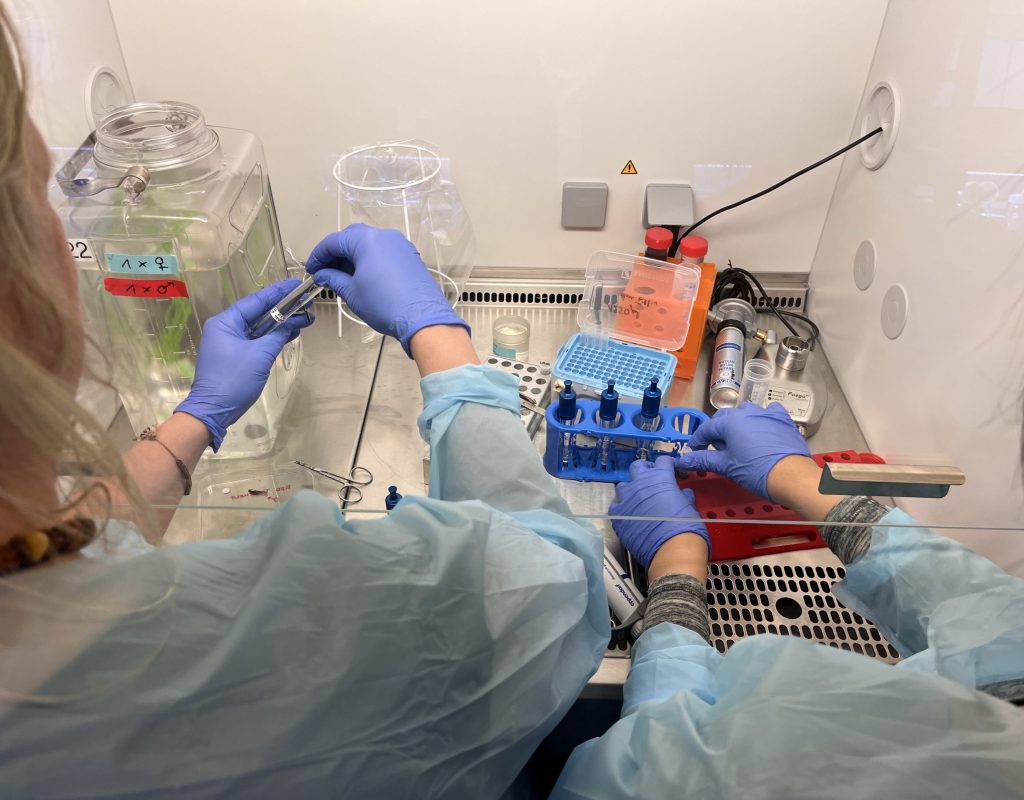research interest
I am a molecular ecologist and biological oceanographer by training and specifically interested in the host-microbe interaction of the sex role reversed pipefish Syngnathus typhle and its microbiota. I use an experimental approach combined with field- and laboratory work to unravel the role of the microbiota during male pregnancy and early microbial colonization.

Coevolution of the host and its microbiota
The coevolution of the host, its immune system and the microbiota allowed a physical integration of environmental microbes, eventually supporting the health maintenance of the host, including development, digestion and protection against pathogens or the colonization of new environments. The microbiota and the host’s immune system remain in a close interaction and are both shaped by several environmental factors over the course of life. While the study of the microbiome has traditionally focused on mammalian gut microbes, recent research has expanded its scope to investigate the establishment of the microbiome before and after birth. Surprisingly, only a limited number of studies have explored the microbial communities in marine organisms across multiple generations.
Parental transfer and primary colonization
The acquisition of highly specific mutualistic microbes can occur via two main routes: horizontal transmission, which involves obtaining microbes from the environment, and vertical transmission, which involves the transfer of microbes from parent to offspring during gestation. In mammals, the microbiota is transferred from parents to offspring during pregnancy, birth and breastfeeding. However, unravelling these critical steps for the transmission of microbiota remains challenging, as egg production, pregnancy and post-natal care are all united within the female body, making it difficult to decipher individual contributions. A unique opportunity to unravel the contributions in microbiota transmission arises in syngnathids, where male pregnancy occurs. This exceptional reproductive system allows for a clearer assessment of maternal provisioning through egg production and paternal provisioning during pregnancy. This enables to shed light on the importance and the interaction of both, the sex-specific transfer of immunological compounds and the sex-specific transfer of microbiota that shape offspring early life development.

CV
- Since October 2021: Doctoral researcher in the Marine Evolutionary Biology group (PI: Prof. Olivia Roth) at Kiel University.
- March 2022 - January 2023: Maternity leave.
- December 2019 – September 2021: Doctoral researcher in the working group "Parental Investment and Immune Dynamics" (PI: Olivia Roth) at the Helmholtz Centre for Ocean Research Kiel (GEOMAR).
- October 2017 - November 2019: Master of Science in Biological Oceanography at the Helmholtz Centre for Ocean Research Kiel (GEOMAR) and Kiel University. Specialization: Marine Evolutionary Ecology & Microbiology
- April 2017 - September 2017: Internship in the lab of Olivia Roth at the Helmholtz Centre for Ocean Research Kiel (GEOMAR). Research focus: Tripartite host-bacteria-phage interactions in a changing ocean
- October 2013 - March 2017: Bachelor of Science in Molecular Ecosystem Sciences at the University of Goettingen, Germany. Specialization: Tropical Forest Ecology
Publications
- Chibani, C. M., R. Hertel, M. Neumann-Schaal, H. Goehlich, K.-S. Wagner, Bunk, B., ... & Wendling, C. C. (2023). Vibrio syngnathi sp. nov., a fish pathogen, isolated from the Kiel Fjord. International Journal of Systematic and Evolutionary Microbiology, 73(6), 005951.
- Parker, J., A. Dubin, R. Schneider, K.-S. Wagner, S. Jentoft, A. Böhne, T. Bayer, and O. Roth (2021). Immunological tolerance in the evolution of male pregnancy. Mol Ecol 1–22.
- Goehlich, H., L. Sartoris, K.-S. Wagner, C. C. Wendling, and O. Roth (2021). Pipefish locally adapted to low salinity in the Baltic Sea retain phenotypic plasticity to cope with ancestral salinity levels. Front Ecol Evol 9:1–21.
- He, J., J. Lange, G. Marinos, J. Bathia, D. Harris, R. Soluch, V. Vaibhvi, P. Deines, M. A. Hassani, K.-S. Wagner, R. Zapien-Campos, C. Jaspers, and F. Sommer (2020). Advancing Our Functional Understanding of Host-Microbiota Interactions: A Need for New Types of Studies. BioEssays 1900211:1900211.
- Wagner, K.-S. (2019). Cultivation and characterization of sex-specific microbiota in the broadnosed pipefish Syngnathus typhle (Masterarbeit). Christian-Albrechts-Universität zu Kiel, Germany, 46 pp.
- Wagner, K.-S., and J. Rajkov (2019). Digest: Lab versus nature: Disease resistance evolution differs between environments. Evolution 73:2540–2541.
Project
My research on „Sex-specific parental transfer of microbiota“ is funded by the European Research Council as part of the ERC starting grant [malePREG] Male pregnancy – Unravelling the coevolution of parental investment and immune defence, a project to study viviparity evolution, sex roles and parental investment beyond the mammalian model.
Gallery
Research interest
I am a molecular ecologist and biological oceanographer by training and specifically interested in the host-microbe interaction of the sex role reversed pipefish Syngnathus typhle and its microbiota. I use an experimental approach combined with field- and laboratory work to unravel the role of the microbiota during male pregnancy and early microbial colonization.
I am a molecular ecologist and biological oceanographer by training and specifically interested in the host-microbe interaction of the sex role reversed pipefish Syngnathus typhle and its microbiota. I use an experimental approach combined with field- and laboratory work to unravel the role of the microbiota during male pregnancy and early microbial colonization.

Coevolution of the host and its microbiota
The coevolution of the host, its immune system and the microbiota allowed a physical integration of environmental microbes, eventually supporting the health maintenance of the host, including development, digestion and protection against pathogens or the colonization of new environments. The microbiota and the host’s immune system remain in a close interaction and are both shaped by several environmental factors over the course of life. While the study of the microbiome has traditionally focused on mammalian gut microbes, recent research has expanded its scope to investigate the establishment of the microbiome before and after birth. Surprisingly, only a limited number of studies have explored the microbial communities in marine organisms across multiple generations.
Parental transfer and primary colonization
The acquisition of highly specific mutualistic microbes can occur via two main routes: horizontal transmission, which involves obtaining microbes from the environment, and vertical transmission, which involves the transfer of microbes from parent to offspring during gestation. In mammals, the microbiota is transferred from parents to offspring during pregnancy, birth and breastfeeding. However, unravelling these critical steps for the transmission of microbiota remains challenging, as egg production, pregnancy and post-natal care are all united within the female body, making it difficult to decipher individual contributions. A unique opportunity to unravel the contributions in microbiota transmission arises in syngnathids, where male pregnancy occurs. This exceptional reproductive system allows for a clearer assessment of maternal provisioning through egg production and paternal provisioning during pregnancy. This enables to shed light on the importance and the interaction of both, the sex-specific transfer of immunological compounds and the sex-specific transfer of microbiota that shape offspring early life development.

Project
My research on „Sex-specific parental transfer of microbiota“ is funded by the European Research Council as part of the ERC starting grant [malePREG] Male pregnancy – Unravelling the coevolution of parental investment and immune defence, a project to study viviparity evolution, sex roles and parental investment beyond the mammalian model.
CV
- Since October 2021: Doctoral researcher in the Marine Evolutionary Biology group (PI: Prof. Olivia Roth) at Kiel University.
- March 2022 - January 2023: Maternity leave.
- December 2019 – September 2021: Doctoral researcher in the working group "Parental Investment and Immune Dynamics" (PI: Olivia Roth) at the Helmholtz Centre for Ocean Research Kiel (GEOMAR).
- October 2017 - November 2019: Master of Science in Biological Oceanography at the Helmholtz Centre for Ocean Research Kiel (GEOMAR) and Kiel University. Specialization: Marine Evolutionary Ecology & Microbiology
- April 2017 - September 2017: Internship in the lab of Olivia Roth at the Helmholtz Centre for Ocean Research Kiel (GEOMAR). Research focus: Tripartite host-bacteria-phage interactions in a changing ocean
- October 2013 - March 2017: Bachelor of Science in Molecular Ecosystem Sciences at the University of Goettingen, Germany. Specialization: Tropical Forest Ecology
Publications
- Chibani, C. M., R. Hertel, M. Neumann-Schaal, H. Goehlich, K.-S. Wagner, Bunk, B., ... & Wendling, C. C. (2023). Vibrio syngnathi sp. nov., a fish pathogen, isolated from the Kiel Fjord. International Journal of Systematic and Evolutionary Microbiology, 73(6), 005951.
- Parker, J., A. Dubin, R. Schneider, K.-S. Wagner, S. Jentoft, A. Böhne, T. Bayer, and O. Roth (2021). Immunological tolerance in the evolution of male pregnancy. Mol Ecol 1–22.
- Goehlich, H., L. Sartoris, K.-S. Wagner, C. C. Wendling, and O. Roth (2021). Pipefish locally adapted to low salinity in the Baltic Sea retain phenotypic plasticity to cope with ancestral salinity levels. Front Ecol Evol 9:1–21.
- He, J., J. Lange, G. Marinos, J. Bathia, D. Harris, R. Soluch, V. Vaibhvi, P. Deines, M. A. Hassani, K.-S. Wagner, R. Zapien-Campos, C. Jaspers, and F. Sommer (2020). Advancing Our Functional Understanding of Host-Microbiota Interactions: A Need for New Types of Studies. BioEssays 1900211:1900211.
- Wagner, K.-S. (2019). Cultivation and characterization of sex-specific microbiota in the broadnosed pipefish Syngnathus typhle (Masterarbeit). Christian-Albrechts-Universität zu Kiel, Germany, 46 pp.
- Wagner, K.-S., and J. Rajkov (2019). Digest: Lab versus nature: Disease resistance evolution differs between environments. Evolution 73:2540–2541.







